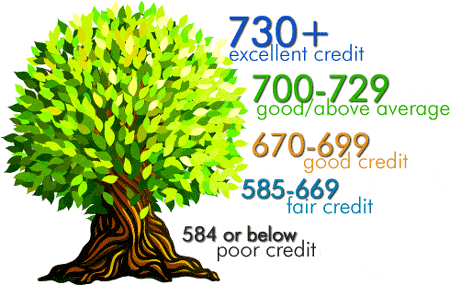Missed mortgage payments, short sales, and foreclosures can all drastically bring down a credit score.
Lenders use credit scores to measure how well a person handles debt. Credit scores range from 300 to 850, with 650 and below considered poor credit. A mortgage makes up a big part of a person’s credit score and often is the most important part of a person’s credit profile.
And just missing a single mortgage payment by 30 days can ruin a credit score, say FICO and VantageScore, which have studied the impact mortgages can have on credit scores. For borrowers, that can be nearly as destructive as a foreclosure to a credit score, according to the companies.
On the other hand, loan modifications, which is when lenders approve new loan terms, have a “very, very minimal” impact to credit scores, possibly dropping the borrower’s score by 10 or 15 points, Sarah Davies, the senior vice president for analytics at VantageScore, told The New York Times.
A good credit score is important not just for financing home purchases, but employers increasingly check credit as well as landlords when seeking rentals. Also, poor credit scores can also mean higher costs on car loans and credit cards.
How a Credit Score Is Affected
FICO evaluated three various scenarios of mortgage holders — a borrower with a great credit score (780), a borrower with good credit (720), and a poor credit borrower (680) — in a study it conducted last month. Here’s the impact FICO found:
? 30 days late on a mortgage payment: The 780 credit score borrower has her credit score fall to 670-690. The 720 credit score borrower has his fall to 630-650. The 680 credit score borrower falls to 600-620.
? Short sale, deed in lieu of foreclosure, or settlement, assuming the balance has been wiped out: The 780 credit score borrower falls to 655-675; the 720 credit score falls to 605-625; and the 680 credit score drops to 610-630.
? Foreclosure, or short sale with a deficiency balance owed: The 780 credit score drops to 620-640; the 720 credit score falls to 570-590; and the 680 credit score decreases to 575-595.
Source: “Fallout From a Poor Credit Score,” The New York Times (April 24, 2011)
For all your real estate needs, call or email
John J. O’Dell By John J. O’Dell I wonder why banks call short sales, short sales? Of course, what they mean by a short sale is that they are agreeing to sell a house for less than the mortgage they hold on the property. After that, short sale means you will complete a sale within a period of three months to one year, maybe. I’ve had two short sales going since November 2010. Last week, one of them gave the go ahead to proceed. Now remember, my buyer has been waiting about five months. So they can wait as long as they want, but they want the buyer to close the deal within 30 days. Of course, they don’t sign the purchase contract, they just tell you go for it! They send you a one sided contract with their very own terms. You ever notice banks make their own rules? My other “short sale”, started at the same time. Well, seems like the bank lost all the paper work. So they said they were not going to go ahead with the sale. It’s a good thing my client has a very lady like scream. So the short sale is back on again. The process is simple, (not) you submit tons of paper work. Then they assign a negotiator who emails you and tells you to upload all the documents you have already uploaded for the second time. (like I said, that’s the same documents that I uploaded in November and they lost) So I don’t know how long I will have to wait for this second short sale, but I’ll let you know, in the meantime don’t hold your breath. I want you around to read my blogs. John is a real estate broker For all your real estate needs call or email: John J. O’Dell DRE# 00669941 On Tuesday, U.S. bank regulators submitted a proposal that would require lenders to originate mortgages with at least a 20 percent down payment if they want to repackage the loan to sell to other investors without keeping some of the risk on their books. The bank regulators say this would create strong incentives for responsible lending and borrowing. For all your real estate needs write or call: John J. O’Dell Visit my other website www.johnodellrealty.com For the first time since 2009, Fannie Mae and Freddie Mac are raising risk fees charged to lenders on loans they buy for resale to investors. Fannie and Freddie also are adding risk fees to more loans offered to borrowers with exemplary credit. Although lenders could absorb the cost, most are expected to add the fees to loan costs. MAKING SENSE OF THE STORY For all your real estate needs Call John J. O’Dell DRE# 00669941 Grouse Ridge Location To read the full story, please click here. The Senate passed the financial regulation bill today, which will impact home buyers and lending guidelines. Chief among the changes impacting consumers is the creation a consumer bureau at the Federal Reserve and the requirement that lenders ensure a borrower is able to repay a home loan by verifying income, employment, and credit history. Read the full story New York Times As the housing downturn has shown, homeownership is about more than buying a home – you have to make sure you can keep the home over the long term. If you’re thinking about buying a home, these five steps can help ensure you get the right house for you and the affordable financing that helps make homeownership a long-term success: 1. Get Educated. A little mortgage know-how goes a long way toward ensuring you get an affordable mortgage Before you hire an agent or find a lender, get educated on the loan process and key factors that make a loan affordable. You’ll want to know about loan types – fixed-rate mortgages, adjustable-rate mortgages, FHA and VA loans – and the full range of line items that contribute to the total cost of securing the loan, including discount points, appraisals, and real estate agent commissions. If you would like more in-depth information, the Department of Housing and Urban Development (HUD) can put you in touch with the nearest housing counseling professional in your area. Visit www.HUD.gov for more information. You can also check with local government, neighborhood associations and neighborhood bank branch offices for information sessions on home buying as well as homebuyer-education programs. The Federal Reserve has been purchasing mortgage-backed securities guaranteed by Fannie Mae and Freddie Mac since early last year. The purchase program has helped maintain low interest rates for borrowers. As planned, the Fed this week announced it will stop purchasing these securities at the end of this month. Many analysts anticipate this will result in a slight rise in rates by year’s end. Making sense of the story for consumers So in short, now is the time to buy real estate while home prices and interest rates are low. John J. O’Dell Looking for Real Estate in Nevada County? Find it at JohnOdellRealty.com Do you have a question that’s holding you back
Real Estate Broker
O’Dell Realty
(530) 263-1091
foreclosuremortgagemortgage paymentshort sale
Why Do Banks Call Them Short Sales? They Should Be Called Long Sales!
General Contractor and civil engineer
You may reach John at Email jodell@nevadacounty.comMortgage Aid Offered to Those Who Cashed Out Equity

The California Housing Finance Agency announced this week that people who cashed out equity on their home now are eligible for three of the four “Keep Your Home California” programs.
Real Estate Broker
O’Dell Realty
(530) 263-1091
Email John jodell@nevadacounty.comRegulators Propose Tighter Rules For Mortgage Backed Securities
Five Signs That Say Now is the Time to “Buy”

Home buyers sitting on the fence wondering if now is the right time to buy should consider five factors when making this decision: Jobs, recent sales activity, construction, mortgage availability, and anecdotal evidence. Each of these issues can help consumers make the best choice for their situation and financial circumstance.
Real Estate Broker
(530) 263-1091
Email John at jodell@nevadacounty.com
DRE# 00669941Fees For Home Mortgages Increase

Real Estate Broker
(530) 263-1091New Online Help From Fannie Mae
Since the start of the housing downturn, the number of Web sites and foreclosure-prevention companies claiming to offer help to struggling borrowers has greatly increased. While some of the businesses are legitimate, others are fraudulent and offer services that consumers may be eligible to receive free of charge.
Making Sense of The Reform Bill as it Relates to Real Estate
Five Steps to Take Before Buying a Home
Continue reading Five Steps to Take Before Buying a Home Nabbing a Bargain-Basement Mortgage Before Rates Rise
Real Estate Broker
from buying or selling now? Call me, I can help
you! 530-263-1091






